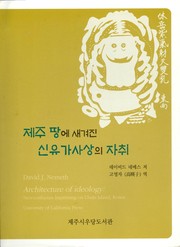Check nearby libraries
Buy this book

A Korean-language translation by Ko Young-ja (2012) of The Architecture of Ideology by David J. Nemeth (1987), with additional materials appropriate to the the translation and update.
Check nearby libraries
Buy this book

Subjects
Jujudo, feng-shui (Korean p'ungsu), cultural landscape, Neo-Confucian ideology, Hallasan, Neo-confucianism, Geomancy, Korea, religion, Civilization, Neo-Confucianism, HistoryPeople
Chu HsiPlaces
Cheju-do, Cheju-do (Korea), Korea (South)Times
1972Showing 1 featured edition. View all 1 editions?
| Edition | Availability |
|---|---|
|
1
The architecture of ideology: Neo-confucian imprinting on Cheju Island, Korea
2012, Jeju Woodang Public Library
Paperback
in English
0520097130 9780520097131
|
aaaa
Libraries near you:
WorldCat
|
Book Details
Edition Notes
Bibliography: p. 229-251.
Classifications
The Physical Object
ID Numbers
Work Description
Cheju Island, Korea's historic island of exile, with a harsh natural environment, early developed a negative image as human habitat. The author challenges this perception and shows how Neo-Confucian state ideology during the Yi dynasty (A.D. 1392-1910) created and conserved the island as a viable habitat by using feng-shui--a powerful medieval science of surveying--to shape the island's built environment and quality of life. The outcome, reflecting sustained political commitment to the philosophical concept of enlightened undervelopment, was a sincere landscape inhabited by a virtuous people. Cheju Island, Korea's historic island of exile, with a harsh natural environment, early developed a negative image as human habitat. The author challenges this perception and shows how Neo-Confucian state ideology during the Yi dynasty (A.D. 1392-1910) created and conserved the island as a viable habitat by using feng-shui--a powerful medieval science of surveying--to shape the island's built environment and quality of life. The outcome, reflecting sustained political commitment to the philosophical concept of enlightened undervelopment, was a sincere landscape inhabited by a virtuous people.
Community Reviews (0)
Feedback?| November 5, 2020 | Edited by MARC Bot | import existing book |
| August 18, 2020 | Edited by ImportBot | import existing book |
| March 4, 2012 | Edited by David J. Nemeth | Added new cover |
| March 4, 2012 | Edited by David J. Nemeth | I announced the republication of Architecture of Ideology (1987) in Korean-language translation (2012) |
| December 10, 2009 | Created by WorkBot | add works page |









